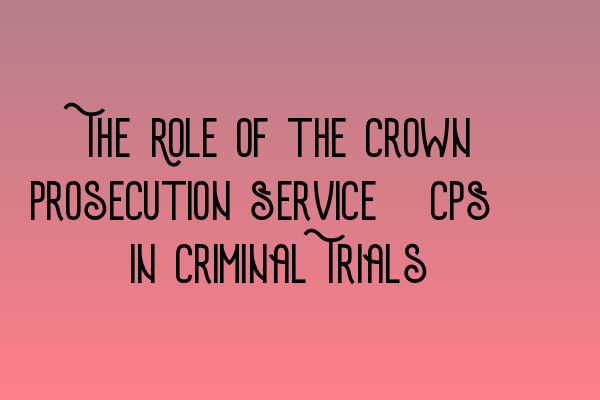The Role of the Crown Prosecution Service (CPS) in Criminal Trials
The Crown Prosecution Service (CPS) plays a vital role in the criminal justice system in the United Kingdom. As the principal public prosecution agency, the CPS is responsible for deciding whether to bring criminal charges, conducting prosecutions in court, and ensuring that justice is served.
Decision-making Process
When a crime is reported to the police, they will gather evidence and present it to the CPS. The CPS then evaluates the evidence and decides whether there is enough to charge the suspect and proceed to trial. This decision-making process is crucial in determining the outcome of criminal cases.
The CPS considers various factors during this evaluation, including the strength of the evidence, public interest, and the likelihood of securing a conviction. They must ensure that there is a reasonable prospect of conviction based on the available evidence.
Conducting Prosecutions
If the CPS decides to proceed with a prosecution, they will represent the interests of the state in court. Prosecutors, who are experienced lawyers employed by the CPS, present the case against the defendant and seek justice on behalf of the victims and society as a whole.
Prosecutors have the responsibility to prepare and present the evidence in a clear and persuasive manner. They question witnesses, examine evidence, and make legal arguments to convince the judge and jury of the defendant’s guilt. Their aim is to secure a conviction based on the available evidence and applicable laws.
Ensuring Justice
The CPS is committed to ensuring that justice is served in criminal trials. They have a duty to act fairly, impartially, and in the interests of justice. Prosecutors must disclose all relevant evidence to the defense, even if it weakens the prosecution’s case.
Furthermore, the CPS is responsible for reviewing cases where new evidence emerges after a conviction. If new evidence casts doubt on the safety of a conviction, the CPS has the power to refer the case to the Court of Appeal, potentially leading to the conviction being overturned.
Conclusion
In summary, the Crown Prosecution Service (CPS) plays a crucial role in the criminal justice system in the UK. Their decision-making process determines whether a case proceeds to trial, and their prosecutors represent the state in court. With a commitment to ensuring justice, the CPS safeguards the integrity of criminal trials and upholds the principles of fairness and impartiality.
For more information about the SQE (Solicitors Qualifying Examination), check out our related articles:
